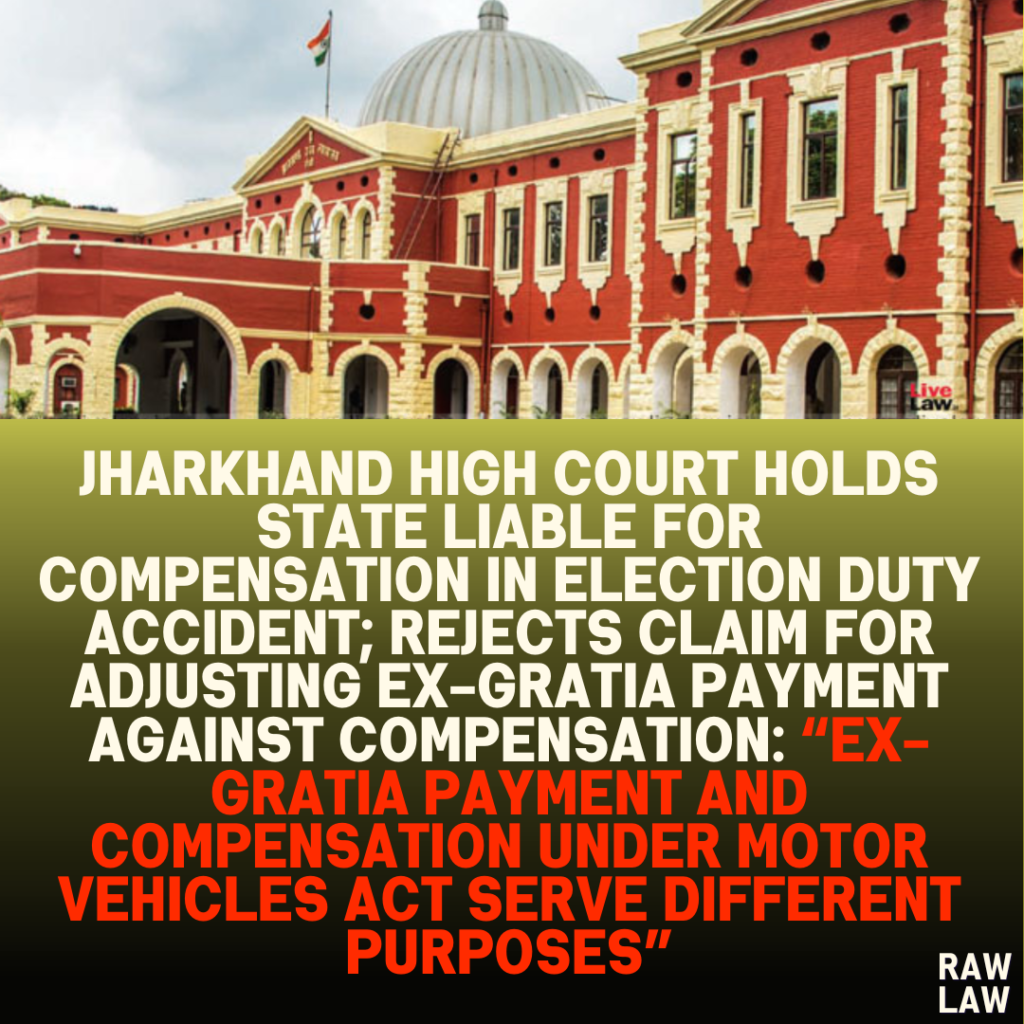Court’s Decision:
The High Court of Jharkhand addressed two miscellaneous appeals arising out of the judgment and award dated 8th March 2016, passed by the District Judge cum Motor Vehicle Accident Claim Tribunal, Court No. 1, Giridih in Title (M.V.) Claim Case No. 46 of 2009. The Court held that the State of Jharkhand is liable to pay compensation as the vehicle was under its control during election duty and rejected the claim for adjustment of the ex-gratia payment made to the legal heirs of the deceased. The appeal filed by the State was dismissed, while the appeal by the claimants for enhancement of compensation was allowed.
Facts:
The case involved the death of an individual, who was a Patrolling Magistrate on election duty. On 29th April 2009, the deceased was traveling in a Tata Magic Jeep, requisitioned by the Election Commission for election purposes. The vehicle, driven by a private driver, met with an accident due to rash and negligent driving, resulting in the deceased’s death on the spot and causing severe injuries to other passengers. The dependents of the deceased filed a compensation claim under the Motor Vehicles Act.
Issues:
- Whether the liability to pay compensation was correctly fixed upon the State despite the vehicle being duly insured and no violation of the insurance policy?
- Whether the ex-gratia amount of Rs. 10 lakhs should be adjusted against the awarded compensation?
- Whether the compensation was rightly determined?
Petitioner’s Arguments:
The claimants contended that the Tribunal erred in fixing the quantum of compensation. They argued that no amount was awarded under the head of “future prospects,” and the compensation under various conventional heads was significantly lower than the established norms. Relying on the Supreme Court’s decision in Pranay Shethi, they argued for an enhancement of the compensation amount.
Respondent’s Arguments:
The State argued that since the deceased was a government servant, his family was entitled to pension, and hence no compensation should be awarded under the head of “future prospects.” The State also claimed that the ex-gratia amount of Rs. 10 lakhs paid to the family should be deducted from the compensation awarded under the Motor Vehicles Act.
Analysis of the Law:
The Court relied heavily on the precedent set in the Supreme Court’s judgment in Deepa Devi and Helen C. Rebello. It observed that when a vehicle is requisitioned for election purposes, the owner loses control over the vehicle, and hence the liability for any compensation shifts to the State. The Court also referred to another case decided by the High Court to establish that ex-gratia payments cannot be deducted from compensation awarded under the Motor Vehicles Act.
Precedent Analysis:
The High Court referenced Deepa Devi to substantiate that during the period of requisition for election duty, the liability shifts to the State and not the insurance company. Additionally, the Court referred to Helen C. Rebello, where the Supreme Court held that ex-gratia payments cannot be adjusted against the compensation under the Motor Vehicles Act unless a clear correlation between the two is established.
Court’s Reasoning:
The Court reasoned that since the vehicle was under the control of the State during election duty, and the insurance policy terms were not violated, the liability to compensate lies with the State. The Court dismissed the argument for deducting the ex-gratia payment, stating that there was no evidence to suggest it was intended to cover the same head of loss as the compensation under the Motor Vehicles Act. The Court also noted that the State failed to provide any written statement before the Tribunal, further weakening its position.
Conclusion:
The High Court held that the State of Jharkhand is liable to pay compensation to the claimants. The Court enhanced the compensation amount to Rs. 32,63,950/- considering the age, monthly income of the deceased, and various conventional heads in accordance with the Pranay Shethi judgment. The appeal for enhancement was allowed, while the State’s appeal was dismissed.
Implications:
This judgment reinforces that the State will be held liable for compensating victims when a vehicle is under its control during election duty, even if the vehicle is insured. It also clarifies that ex-gratia payments made by the State cannot be adjusted against compensation under the Motor Vehicles Act unless there is clear evidence of double recovery. This decision could have broader implications for claims involving vehicles requisitioned by the State for public purposes.



